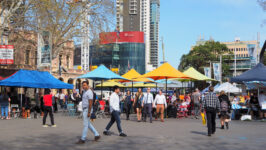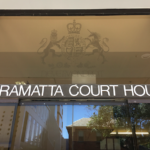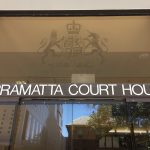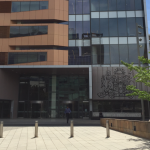Parramatta Police Crack Down on ‘Anti Social Behaviour’

A police blitz targeting ‘antisocial behaviour’ in the Parramatta region over the weekend has resulted in seven people being charged with criminal offences and 26 being handed criminal infringement notices.
Police from Parramatta Area Command, North West Metropolitan Region Operations Support Group, and specialist units including the Dog squad, the notorious Strike Force Raptor and the Traffic and Highway Patrol Command teamed up for the two-day operation, targeting alcohol and drug-related offence across the Parramatta CBD.
Police say the operation was conducted a result of an increase in antisocial behaviour and minor crime over the past several months. They call these operations ‘proactive policing’, which are signified by a strong and highly visible police presence, intended to deter crime and make people feel safer.
Seven people charged with criminal offence
Seven people were charged with criminal offences including affray, drink-driving, possessing stolen goods, having custody of a knife in a public place and breaching bail.
More than 1,220 roadside breath tests and 24 roadside drug tests were conducted, with seven defect notices being issued.
Personal and vehicle searches
125 people were subjected to personal searches and more than 30 vehicles were searched during the blitz.
The powers of police officers to stop and search a person or a vehicle without a warrant are contained in the Law Enforcement (Powers and Responsibility) Act (LEPRA) 2002.
Section 21 of that Act provides that an officer may stop, search and detain a person without a warrant if he or she “suspects on reasonable grounds” that the individual possesses stolen property, has anything used, or intended to be used, to commit an offence, is carrying a dangerous item or weapon, or is in possession of illegal drugs.
Section 36 of the Act provides that police may stop, search and detain a vehicle without a warrant if they have a reasonable suspicion that it contains stolen items, has been used in an offence, is carrying anything used, or to be used, in an offence, or is carrying any illicit substances.
Officers can also search a vehicle if it is in a public place or in the vicinity of a school, and they reasonably suspect it contains a dangerous item, or is putting the public at risk, or if you provide your informed consent to the search.
An illegal search can result in the exclusion of evidence derived from the search (eg drugs or weapons found during the search), and charges being thrown out of court as a result.
Criminal Infringement Notices (CINs)
During the blitz, 26 criminal infringement notices were also issued, which are a mechanism by which police can punish a person for a suspected offence without having to send them before a magistrate.
Since 1 November 2007, police have been empowered to issue criminal infringement notices for a range of suspected criminal offences.
These offences now include:
- Stealing (if the value of the property or sum of money is under $300),
- Offensive language,
- Offensive conduct,
- Unlawful entry of a vehicle/boat,
- Obstructing traffic,
- Goods in custody reasonably suspected of being stolen,
- Continuation of intoxicated and disorderly behaviour following a move on direction, and
- Possessing a small quantity of prohibited drugs
How do police decide whether or not to give a CIN?
If police have a ‘reasonable suspicion’ that you have committed a relevant offence, they can choose to either issue you with a CIN or take you to court by giving you a Court Attendance Notice (CAN).
It is a matter of discretion, and police are supposed to take a range of factors into account when making their decision.
Relevant factors include the public interest – for example, if it’s not worth the public expense of taking the case to court because it is so trivial the police may issue a CIN instead, especially if the court is likely to deal with it by way of a ‘section 10 dismissal or conditional release order’ anyway, which means without a criminal.
The attitude of the suspect, their age, their criminal history (or lack thereof) and even the fact that police have other duties to attend to at the time may also be taken into account.
On-the-spot fines mean that the allegation is dealt with quickly and without using the resources of police and the courts.
But they have been criticised for giving police too much power because, in most cases, it allows them to have the final say about whether a person is guilty.
This is because the vast majority of people are unwilling to incur the additional expense, time and risk of fighting the case in court – especially because if they do so and are not successful, they risk a more severe penalty (eg a larger fine) and a criminal record, whereas CINs do not come with a criminal record.
The availability of CINs also means that police are far more likely to act upon extremely trivial offences, because they don’t have to go back and complete paperwork, obtain statements or spend time at a court hearing.
CINs may also lead to the greater targeting of vulnerable groups such as the homeless, Middle Eastern youth and Indigenous people.
Can I contest a CIN?
If you are not guilty, you can choose to contest your CIN by electing to take it to court.
This must be done within 21 days.
After filling out the back and sending the CIN to court, you will be sent a Court Attendance Notice telling you when and where you are required to attend court.
However, don’t automatically assume that going to court is your best bet even if you think that the CIN was unfair.
Before choosing to do so, always speak to a criminal defence lawyer – as they will be able to explain what is likely to occur, including the potential costs, the timeframe and the likelihood of success.
Going to court may mean taking days off work, hiring a lawyer and still possibly being found guilty in court.
And again, you may risk a criminal record.
Of course, police will know this when they are issue you with a CIN.
Going to court for a traffic offence?
If you are going to court for a traffic offence, call or email Sydney Criminal Lawyers anytime to arrange a free first consultation with an experienced, specialist traffic lawyer who will accurately advise you of your options, the best way forward, and fight for the optimal outcome in your specific situation.






